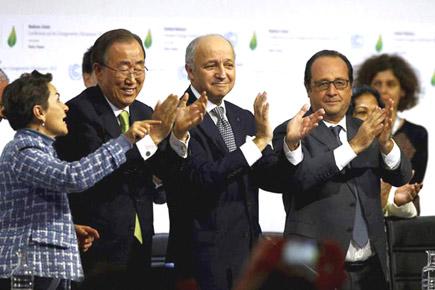The Paris agreement on climate change was largely welcomed by stakeholders in India and abroad, including Prime Minister Narendra Modi's government, but there was also the concern that the rich countries could have done more to save the planet from the effects of global warming.

Paris Agreement
New Delhi: The Paris agreement on climate change was largely welcomed by stakeholders in India and abroad, including Prime Minister Narendra Modi's government, but there was also the concern that the rich countries could have done more to save the planet from the effects of global warming.
ADVERTISEMENT

French President Francois Hollande,French Foreign Minister and president of the COP21 Laurent Fabius, United Nations climate chief Christiana Figueres and United Nations Secretary General Ban ki-Moon applaud after the final conference at the COP21, the United Nations conference on climate change in Paris. Photo: AP
Modi hailed the agreement on climate change as the collective wisdom of world leaders to mitigate the danger, adding that there were no winners or losers in the outcome of the agreement.
"Deliberations at the 21st Conference of Parties (CoP21) and Paris Agreement demonstrate the collective wisdom of world leaders to mitigate climate change," Modi said on Sunday. The outcome of the Paris agreement has no winners or losers; climate justice has won, he said.
The landmark Paris Agreement on climate change was adopted by 196 countries, committing them to curb global warming to well below two degrees Celsius and outline a roadmap to raise $100 billion annually towards a green fund for developing nations.
"For the first time, every country in the world has pledged to curb emissions, strengthen resilience and join in common cause to take common climate action. This is a resounding success for multilateralism," said UN Secretary General Ban Ki-Moon.
US President Barack Obama called the agreement a "turning point for the world" and said it sent powerful signal that the world was firmly committed to a low-carbon future.
Environment, Forests and Climate Change Minister Prakash Javadekar said the pact could have been more ambitious as the commitment from rich nations was "much below" what was expected of them, but the basic concept of 'common but differentiated responsibilities' was largely addressed.
"To achieve big things as there are languages and many issues, when 196 countries are putting their efforts together, one needs to be accommodative without changing the thrust of the agreement. We've done everything to maintain that thrust," Javadekar said.
"Today is a historic day. What we have adopted today is not only an agreement but a new chapter of hope in the lives of seven billion people," the minister said at the closing plenary in Paris.
"Today we reassure our future generation that we all will mitigate the challenge posed by climate change and give them a better future."
At the Conference of Parties (CoP), India provided leadership to the interests of the developing countries and lesser developed countries, Minister of Power Piyush Goyal said after the Paris accord was adopted.
"At CoP 21,196 countries assembled to tackle the most difficult problem facing our planet. 1,600 dissent points reduced to 0 in 10 days," Goyal said.
Nirmala Sitharaman, minister for commerce and industry, also applauded India's role at the CoP 21 and hoped for climate equity and justice for India.
However, environment protection organisation Centre for Science and Environment (CSE) called the deal "weak and unambitious" as it erases the historical responsibility of the developed countries.
"The draft Paris agreement continues to be weak and unambitious, as it does not include any meaningful targets for developed countries to reduce their emissions," said Sunita Narain, director general, CSE, in a statement.
Narain added that the agreement did not operationalise equity and that the term carbon budget did not even find mention in the text, which would end up furthering "climate apartheid".
CSE analyses that India will be under constant pressure to take more burden for mitigating climate change by 2020 and beyond, especially when the next review of all the nationally determined contributions of countries take place.
 Subscribe today by clicking the link and stay updated with the latest news!" Click here!
Subscribe today by clicking the link and stay updated with the latest news!" Click here!






